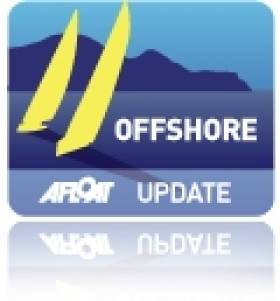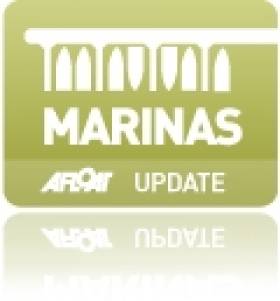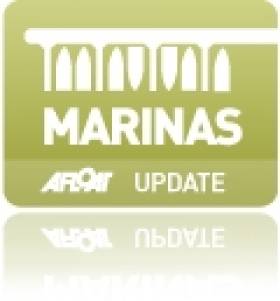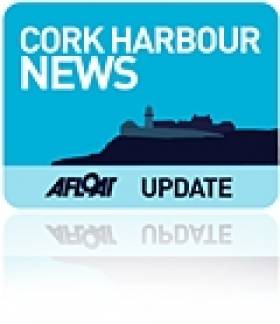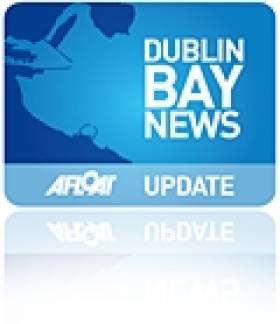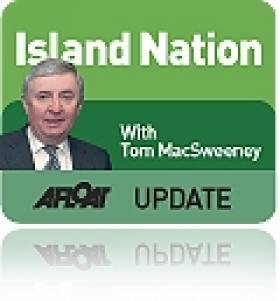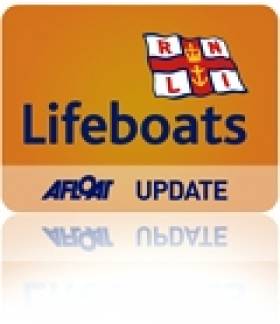Displaying items by tag: Monkstown
Hugo Boss Open 60 Stops Off At Cork Harbour Marina
#Offshore - The Open 60 Hugo Boss made a surprise visit to Cork Harbour Marina in Monkstown Bay at the weekend, giving some 50 local junior sailors a tour of the vessel - and hopefully inspiring their future in offshore racing.
Skipper Alex Thomson said he and his crew were not far off Land's End in Cornwall after a leak discovered in the starboard ballast tank required overnight repairs.
But rather than sail back to Falmouth, Thomson reckoned they could find a suitable deep-water berth on Ireland's south coast.
A few phone calls later from the team's business manager (and Corkonian) Stuart Hosford, and they had a place waiting for them in Monkstown Bay, which can boast of over eight metres of water at low tide - more than enough for a vessel of Hugo Boss' stature.
"We could not believe it when we found a welcoming committee on the dock when we arrived at 3.30am on Saturday," said Thomson.
"The marina owner, James O’Brien, was there to help us dock and some Monkstown Bay Sailing Club members took us up the Boson Guest House, where they had reserved rooms for us whilst we were still at sea."
After a hearty cooked breakfast, and a free lunch from Hassett's Bakery in Carrigaline, Thomson and crew found they were the "star attraction" in Monkstown "with a steady flow of visitors who just wanted to see the boat while we worked on it".
When the team hauled up the mainsail to check the rigging they inadvertently made a new addition to Cork Harbour's skyline, even blocking out the view of Cobh Cathedral!
But it wasn't all work for Thomson and company, as the skipper said Sandy Rimmington and other club members were on hand to help with repairs "and we were able to relax in the club on Sunday night, drinking stout until all hours with local sailors and the survivors from watching the Munster match in the afternoon."
Before the Open 60 departed yesterday (28 April) en route across the Atlantic to New York, Thomson described their impromptu visit to Cork Harbour as "one of those serendipitous incidents. We were lucky to be near Monkstown when we ran into a problem, rather than mid-Atlantic. What a great place to have to visit by accident!"
He also expressed his hope that "the next phase of development for the marina will go ahead and yachts such as ourselves will be able to use the facilities again in the future.
"With this development in place, Monkstown and Cork Harbour will be much more attractive to play host to a major international race. It is ideally located as a base and destination for offshore racing."
Monkstown Penthouse Comes With Panoramic Views
#WATERFRONT PROPERTY - An exceptional two-bed penthouse apartment with some of the finest views available to a Dublin-based property is now on the market for €295,000.
The Penthouse at 46 De Veschi House on Longford Place comes with a superb waterfront location just a short distance from the top-class amenities of Monkstown village and Dun Laoghaire, and is adjacent to both the Dun Laoghaire Motor Yacht Club and Irish National Sailing School.
With a living room situated at the very top of the development, there are panoramic 360-degree views from the mountains to the sea and a wonderful sunny aspect at all times of the day.
The property has an unusual design and is circular in shape, offering well proportioned rooms and facilities associated with modern day living, including a spacious master bedroom with an en suite shower room and two large terraces accessed from the lower level. There are two double bedrooms and a large welcoming hallway leading to a good size kitchen.
The development is well maintained and secure, with access to the top floor from a lift. There is a bright modern entrance lobby from the street and access to two allocated underground car spaces.
Viewing is strictly by appointment with Sherry FitzGerald Dun Laoghaire, which has more on this property HERE.
New Marina for Cork to Create 32 Full Time Jobs
#JOBS – Cork County Council have issued a notice of intention to grant planning permission to allow the expansion of Cork Harbour Marina, Monkstown to a larger and more comprehensive 285 fingered berth marina as reported previously on Afloat.ie. The expansion will allow for 175 car parking spaces, a marina pavillion building to incorporate a provisions shop, cafe/bar/restaurant, chandlery, marine and boat sales office, Gym, changing rooms with showers, toilets and laundry facilities. All 285 berths are fully serviced, secure fingered berths ranging in size of up to 18m in length, a reception berth, a fuelling berth with diesel and petrol available and a pump out facility berth. The car park and pavillion will be encompassed by a public promenade with seating, panoramic viewing platform, viewing deck promontory and a nature awareness garden.
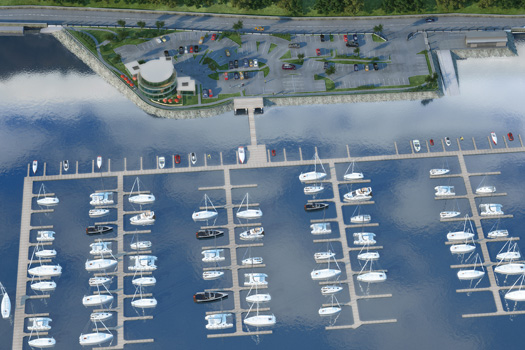
An artist's impression of plans for an expanded marina at Monkstown
This expansion will lead to one of Ireland's finest marinas facilities which will support up to 90 jobs both directly and indirectly, of these 32 will be full time permanent jobs on the completed Marina complex. The Marina is a unique development, destined to be the South of Ireland's first Blue Flag marina with world-class facilities for berth holders and visitors alike which will allow Cork to capture a bigger slice of the world marine leisure market worth approx €928 billion annually. Initially, set up to address the deficit of safe berths in the Monkstown Bay area the facility is a credit to the Irish team that invested, designed and built it, and of their ambitious plans for its expansion to a five star facility to rival any that Europe has to offer.
A €1.5 million investment into the Irish economy was required to complete the first phase, namely an 82 berth state of the art floating concrete marina. Project co-coordinator James O'Brien advised that "having secured a grant from SECAD (South and East Cork Area Development) and private investment, Monkstown Bay Marina Company proceeded with the totally Irish construction project. All local contractors were employed, from engineering to carpentry to provision of water supplies, to mooring and anchoring specialist teams".
When questioned if he felt that it was wise to undertake such a project during a recession, Mr O'Brien felt that the project will actually help Cork recover from the recession, "In recent years, the lack of marina and berthing facilities in Cork Harbour, the second biggest natural Harbour in the world has been recognised as having a negative impact on the amount of yachts and marine leisure holidaymakers visiting the harbour, and utilising onshore facilities, both in the in the immediate locality and Cork County". Located just 7kms from Ringaskiddy Ferry Port, with access to the UK several times a week and Roscoff in France once a week. A weekly service to Spain is also under negotation, at this time making Cork Harbour Marina the ideal place to winter a visiting boat or to place it in Ireland for multiple family visits, and with the world class cruising grounds of West Cork.
Having a slip (or berth) at a marina offers convenience, security, services, amenities, and a social atmosphere to enjoy. There are broader quality of life benefits for users also, such as improved safety, to-and-from access, and the availability of other essential services, such as electricity to effect repairs, fuel at a convenient marina location, or provisions, parts or repairs being delivered directly to any boat as necessary. Berth spaces are currently available to rent long and short term, at competitive costs.
The boating public have eagerly awaited the new marina for many years, and the response has been one of huge endorsement and positivity, with rapid take-up of berths, and a high incidence of short stay and overnighting too, all bringing much needed tourism revenue to a village that most, up to now, would have sailed or motored past!
Cork Harbour Marina offers an asset-backed; Bord Failte approved BES scheme, in one of the only tax shelters left available to the Irish investor. Full details of this BES scheme are available on request. Berths are allocated on a first come first served basis, all enquiries regarding berthing space should be directed to James O'Brien on 087 3669009
Monkstown is an attractive seaside village that offers visitors beautiful walks in a stunning location - even walking the marina, visitors can enjoy this tranquil and picturesque harbour setting.
South of the city, the marina is also served by a regular bus route, No 223, allowing easy access to Cork City's shopping and social scenes, one of the top cities in the world for a short break, according to a recent Trailfinder survey. Cork Harbour Marina is also only 2kms from the Cross River Ferry, giving easy access to Great Island and East Cork.
For those choosing to stay for an extended period, various ancillary services can be organised - provisioning, refuelling, cleaning, antifouling, boat maintenance and repairs, sail repair, and winter storage both outdoor and covered. The marina team can also organise a boat delivery or recovery service provided by competent Offshore Yacht masters.
Cork Harbour marina is the closest marina to the suburbs of Douglas, Rochestown and Passage West, nestles right in front of the stunning Monkstown village, is convenient to Monkstown Sailing, Rowing, Golf and Tennis Clubs, and the world renowned Bosun Restaurant and Guesthouse, the convivial Monkstown Inn, and the proposed Monkstown Amenity Park, which the local communities are pushing toward completion.
In brief, Cork Harbour Marina is Ireland's newest coastal marina with all year round berthage. The marina itself can accommodate boats up to 17m and consists of an outer perimeter of floating concrete break waters with fingered berths contained internally.
View Larger Map
'Cork Harbour Marina' is Ireland's Newest Coastal Marina
Phase one of a planned 300-berth marina facility in Monkstown Co. Cork, aptly named 'Cork Harbour Marina', is Ireland's newest coastal marina and is offering all year round berthing facilities for pleasure craft.
The new addition to the seaside village is in a sheltered location on the western bank of the River Lee in an area very popular for boating activities.
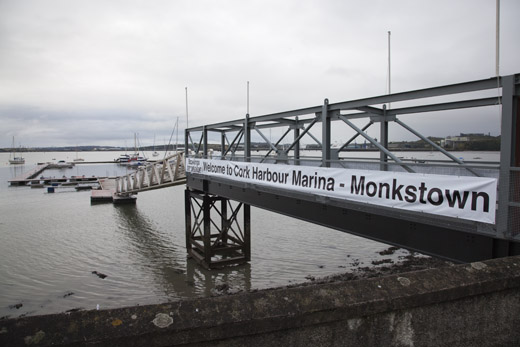
The new marina at Monkstown in Cork harbour
Accordng to the marina website a grant secured from SECAD (South East Area Development) assisted in the development of the marina and it is claimed the new facility will allow a wider range of people to get afloat in Cork Harbour, the second biggest natural harbour in the world.
Annual and long-term lets are now being taken.
Plans include promoting sailing in the area to older people, people with disabilities and for some less active men and women to get involved on the basis 'it is far easier and safer for such sailors to access their boats from a pontoon than a swinging mooring', the marina website says.
The new facility can accomodate boats up to 17m and consists of an outer perimeter of floating concrete break waters with fingered berths contained internally.
The 'Cork Harbour marina' web site is here.
‘Call for Events’- Cork Harbour Open Day
This year's Cork Harbour Open Day will take place on Saturday 10th September. The event aims to embrace the best of what Cork Harbour has to offer.
The Open Day seeks to raise awareness of the different free activities and events available for families in the harbour both on and off the water. If you would like to be involved in Cork Harbour Open Day or organise an event on the day, please contact Sara MacKeown Tel: (021) 4625375 or by email: [email protected]
All of the events will be promoted on the lead up to the day via PR, advertising and social media. For further information www.corkharbour.ie
Organisers of the Focus Ireland Triathlon in Dun Laoghaire on Sunday 31 July have announced a list of road closures in the area, and have also put out a call for volunteers to assist on the day.
Full road closures will be necessary from 7.45am to 11am in the Blackrock, Monkstown and Dun Laoghaire areas. A complete list plus a map of road closures and diversions are available to download below.
Meanwhile, volunteers are required to assist in all aspects of the event. Canoeists and kayakers are especially needed for safety support during the swimming section of the race.
Anyone who has some time to help out on the day, or who can supply canoes or kayaks for the event, is urged to contact events assistant Anne Griffin at [email protected].
Entries are still open for the Focus Ireland Triathlon, which comprises a 750m/350m swim, a 20k cycle and a 5k run. Registration is €80 for individuals/€240 for teams and entries can be made at www.focusireland.ie. For more details call 1850 204 205 or e-mail [email protected].
National 18s -72 Years Old and Still Sailing
My first experience of racing was in a National 18 wooden dinghy and it was rough. Inexperienced as a crewman during a race in Monkstown Bay, I slit the top of a finger across a chain plate while pulling in the headsail sheet.
Blood started to pour out of the cut. With the dinghy having only a short freeboard I did what seemed best. To avoid getting blood on the sail which is a heinous crime aboard sailing boats, I put my hand in the water to wash away the blood.
A roar from astern heralded the Skipper's response:
"Get your b....hand out of the water, you're causing drag," which meant I was being accused of the crime of slowing the boat down in a race where there was little wind and every bit of forward momentum was important.
I began to explain and made the mistake of asking where I should put my bloodied finger!
The answer is not printable, but taught me that National 18s didn't take competitive sailing lightly.
I grew to love those boats, their beautiful lines, their speed and their demands on the crew with a spinnaker up. Inevitably, with the cost of maintaining wooden boats, the glass fibre boats (GRP), took over, but the National 18 Class kept going, primarily based in Crosshaven.
Then the 1720s arrived, named after the year when the Royal Cork Yacht Club was founded, powerful new boats which were predicted to wipe out the National 18s. They didn't. Despite becoming very popular for a time, their support declined and the National 18s continued, not alone surviving, but strengthening
This week the Class has announced that it intends to host "the largest gathering of National 18s in the history of this legendary boat."
Next year's Class Championships, better known as the Cock O' the North and sailed in alternative years in Ireland and the UK, where the National 18 is also popular, will be held in Crosshaven from July 24 to 29.
"We are calling on everyone interested to get in touch and take part in what is going to be a great occasion, whether you are a former 18 sailor or someone looking for a new challenge," Class Captain Peter O'Donovan told me. "We are putting in a big effort to get former 18 sailors and their boats back on the water."
It is hoped that at least 50 boats will take part "and perhaps even more," said Peter who has been trawling class records to find former owners and boats which will be arranged in three divisions for the event.
"We decided to include a Classics section, which will encourage those who owned the beautiful wooden, clinker boats, to sail again with us. Some of these boats have reappeared in Crosshaven, we know of others in West Cork and further afield," said Peter.
There will be a section for the "Penultimates," the older fibreglass 18s which "have been hiding in garages, just waiting to be taken out again" and the "Ultimates," the modern fibreglass boats at the front of the present fleet.
"We want to make this a special event and so far there has been interest from Schull, Baltimore, Waterford, Wexford, Arklow and Lough Derg. Further afield, we expect to see visitors from Scotland, the Isle of Man, Essex, Tamesis and Chichester Harbour and we have even had a request for information from Germany."
One of the famous boat building family in Arklow, James Tyrrell, is amongst those who have owned and sailed a National 18. Another sailor of the boats was Peter Crowley, present Chairman of the Irish Sailing Association.
He sailed with Tommy Dwyer from Monkstown who is regarded as an icon of the National 18 fleet in Cobblerod. Tommy now sails Das Boot.
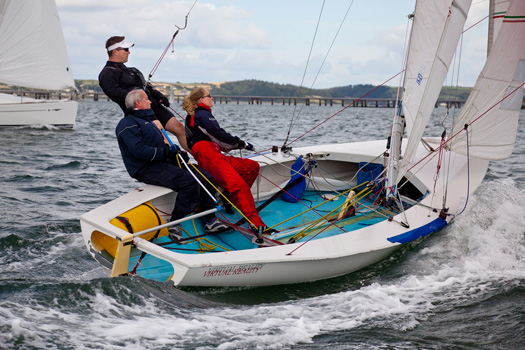
Fun in the National 18. Photo: Bob Bateman
"She was recovered from the bottom of Cork Harbour and I refurbished her. said Tommy, "We named her after the U-boat which featured in the film of that name."Tommy has been sailing National 18s for over 40 years. Every year his name has been amongst the trophy winners.
"For those interested in sailing, we would like to hear from those who would like to crew in the championships," Peter O'Donovan told me. "In addition, we are compiling a list of boats available for charter across the three divisions. For anyone not looking to sail, but just to be part of the event, we will also require assistance with rescue vessels, committee boats and other aspects of the event. It is also hoped to put together a collection of photographs from days gone. We would like to hear from anybody with material. Former 18 sailors who cannot get involved in the event could join us at the Class Dinner and renew acquaintances."
Anyone interested can contact the National 18 class by Emailing Peter O'Donovan at [email protected] or on phone 087 2491720 or Email Kieran O'Connell at [email protected]
The original idea for the building of National 18s was that of Frank Knowling of Whitstable YC in the UK, who later became known as the 'father' of the class. In 1938 he wanted an 18-foot dinghy, suitable for day sailing, yet fast enough to be of interest to racing sailors and at a reasonable cost.
The UK national sailing association and Yachting World magazine organised a design competition won by well-known designer Uffa Fox with a proposal for a clinker-built wooden boat. Another major designer, ¸, had also submitted a proposed boat. The first National 18 was named 'Hurricane,' owned by Stanley Beale and sailed at Whitstable.
It was not until after World War that building of 18s got underway. The Class Association was established in 1947 and by 1950 fleets had appeared at clubs around the coast of Britain and Ireland.
Seventy-two years after the first moves to build National 18s they still survive, a tribute to a great boat.

This article is reprinted by permission of the EVENING ECHO newspaper, Cork, where Tom MacSweeney writes maritime columns twice weekly. Evening Echo website: www.eecho.ie
Five Incidents in Four Days for Cork Harbour Lifeboat
Crosshaven Volunteer RNLI Lifeboat has had a very busy few days as they were tasked to five incidents in four days.
On Thursday evening at 17.59, the Lifeboat was tasked to the upper reaches of Cork Harbour near the city to check out an unidentifiable object in the water. On arrival, the object was found to be a large bag containing foam. Friday evening, saw the Lifeboat heading up the Owenabue River to rescue two punts which had been floated off on the very high Spring tides and were perceived a danger to shipping.
Saturday evening at 20.34, the Lifeboat was again tasked to the North side of Great Island where a 55' Motor Launch with 3 persons on board had mechanical difficulties and drifting in high winds of force 7. On arrival at scene, the crew decided that because of the size and weight of the vessel and the high winds it was safer to anchor the vessel and take off the crew. They were safely landed at East Ferry Pier. As the Lifeboat was returning to Crosshaven, The Coastguard at Valentia again tasked the Lifeboat to search the area between Cobh and Monkstown for an overdue Rigid Inflatable Boat (RIB). After searching for a period, and with nothing found, the Coastguard stood down the volunteer Lifeboat crew to return to station.
Sunday afternoon, and the pagers were again activated at 16.33 to go to the aid of a small boat with engine problems at East Ferry. On arrival in the area, it was noticed that the casualty boat had managed to restart and head into East Ferry Marina.
Related Safety posts
RNLI Lifeboats in Ireland
Safety News
Rescue News from RNLI Lifeboats in Ireland
Coast Guard News from Ireland
Water Safety News from Ireland
Marine Casualty Investigation Board News
Marine Warnings



























